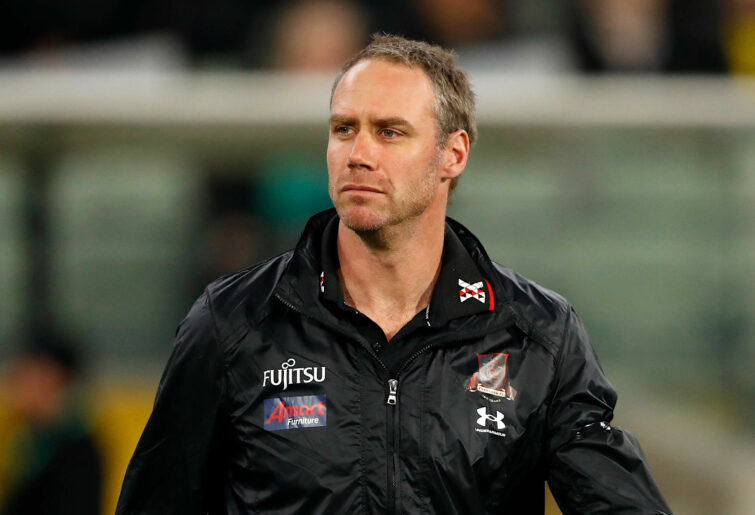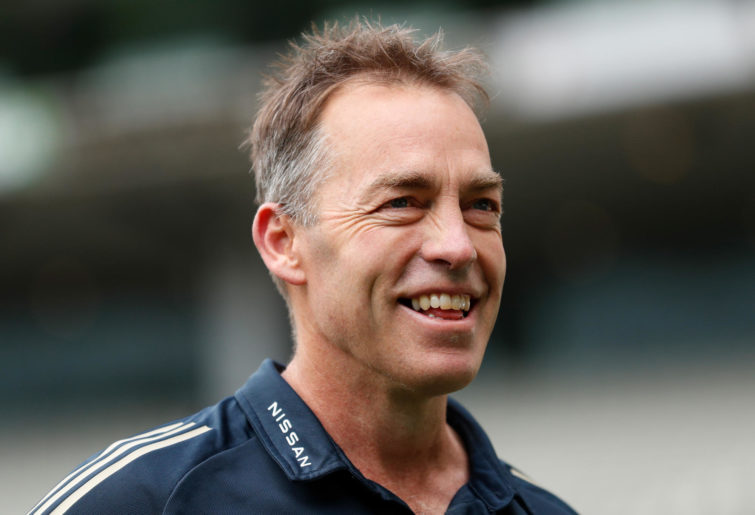Essendon’s last-ditch, harebrained and ultimately unsuccessful pursuit of Alastair Clarkson is the latest embarrassment in a long line of incredible embarrassments that have seen a one-proud club spectacularly fall from grace.
The Bombers could not have handled this last week any worse had they been trying.
From moving on president Paul Brasher, a public backer of maintaining the status quo, seemingly to facilitate the Clarkson pursuit; to the reprehensible treatment of incumbent Ben Rutten; to the haste of the decision to throw their hat into the ring for the four-time premiership coach on the eve of his looming decision to coach North Melbourne, this was a grim few days for a club that was already all but confirmed as the AFL’s resident laughing stock.
Hopefully, for the sake of long-suffering Bombers fans who have long been drained of the arrogance and entitlement that still permeates far too many facets of this one-time powerhouse, Clarkson’s decision that North Melbourne, a club with two wins for the season and arguably the worst playing list in the competition, is a more palatable coaching destination brings with it enough introspection to get the club out of the hole in which it currently lies.
Or at least, gets them to stop digging deeper.
As it stands, Essendon could not be further away from the glory days of the 1980s and 1990s; unthinkably for a club with a league record 16 premierships, September will mark 18 years since they last won a final.
In virtually every aspect of its operations, this club needs an urgent rethink, or that number will only grow.
On the field, there is real talent on the Bombers’ list, as evidenced in their slashing form leading into last year’s finals series.
But this year, as well as countless others over the journey, has seen the Dons stuck in no-man’s land between their trademark exhilarating, high-octane and ultimately un-finals-worthy game plan, and attempting to build something less flashy, harder to watch, but ultimately more likely to end their barren September run.
Rutten attempted to do this to start the year; the results were disastrous. Panned by a veritable hit list of club legends that bob up in all facets of the media, as well as disgruntled fans and even his own playing group, the Bombers were woefully equipped in every facet to adapt their game plan in the way anyone with a lick of sense could see was badly needed.
Patience, rather than hysteria, was required: but that has never been the go for a club that views any period at all without success as a time to panic.
Some of the failures of this campaign might be Rutten’s fault, but scapegoating the coach without meaningful off-field change is a recipe for disaster. Richmond in 2016 avoided the former by retaining Damien Hardwick, and succeeded in the latter with a radical shift in their assistant coaching set-up. The result was three flags in four years and a return to heavyweight status.

(Photo by Dylan Burns/AFL Photos via Getty Images)
In contrast to the Tigers, the disconnect between Rutten’s coaching path, and the cattle at his disposal, could not be more distinct. Which is where Adrian Dodoro, the Bombers’ resident Teflon man, comes in.
In most measurable ways, Dodoro’s tenure at the club has been a success; the Bombers regularly bring in the cream of the crop of the player pool, are infamous for their hard-nosed trading approach, and have won more trade periods than finals in the last decade and a half (admittedly not a hard thing to accomplish at Windy Hill these days).
But there is surely a difference between signing self-designated ‘star’ players, and those best equipped to fit the needs of the team already in place. It’s here where Dodoro has routinely come up short, with next to no internal accountability.
Throughout the Bombers’ 18-year finals barren drought, surely only Jobe Watson among the playing group has a claim to being a legitimate star of the game. Zach Merrett could be close to that level in the right environment, but he’s nowhere near the likes of Marcus Bontempelli, Christian Petracca or Lachie Neale as it stands.
That’s a long time to go without a bona fide A+-grader, especially given the Bombers routinely use their power and stature as a league powerhouse to recruit quality free agents on a yearly basis. But even that leads to problems.
Fresh off a 2017 finals appearance in which their best was thrilling, but were too often shown up defensively by the best sides in the competition, the Bombers went hard at the trade period to try and push themselves into serious contention.
The three main players they identified, to solve their dearth of inside midfielders and stronger defensive bodies, were… Jake Stringer, Adam Saad and Devon Smith.
All are fine players – Smith even won a best-and-fairest as a tackling king in 2018 before injuries derailed his career. But fine players or not, all were the type of attacking, forward-first players the Dons already had an abundance of.
None could help the Bombers do more than just tread water for the next two seasons, ultimately costing John Worsfold his job in a coaching succession plan that read as the longest walk to death row a coach has had since Mick Malthouse.
Compare that to Carlton this season, whose most influential recruit has not been the highly-paid Adam Saad, or Zac Williams, or Adam Cerra; but rather a bargain buy in George Hewett, whose underrated fast hands, tackling pressure and strength at winning contested ball has instantly made the Blues a far more rounded and ruthless midfield.
The Blues identified a player to fit their needs, something Dodoro has all too frequently shown himself as incapable of.
It was only out of necessity, amid a player exodus that saw Joe Daniher, Adam Saad and Orazio Fantasia all unceremoniously depart, that saw the Bombers finally head to the draft in a meaningful way in 2020.
It will take time and patience, but all of Nik Cox, Archie Perkins, Zach Reid and 2021 first-round pick Ben Hobbs have shown potential to lead the next generation to brighter times ahead.
Off the field, the Clarkson saga is nowhere near the biggest controversy to have engulfed this club of recent times, but it is reflective of a continued ‘big-club mentality’ that is time and again tearing Essendon apart.

(Photo by Michael Willson/AFL Photos via Getty Images)
Say what you will about the infamous substances scandal and the fallout that ensued; we may never know just how culpable the Bombers’ hierarchy were, and many associated with the club still maintain they were unjustly witch-hunted – not without cause.
But the scandal turning into a five-year sordid affair, costing the club millions and the 2016 seasons of 34 players, was entirely of their own making. Very few, if any, other clubs, regardless of their size, would have had sufficient naivete and hubris to think they could take on the house and win.
The Bombers tried, and the results were catastrophic. That’s why, years after NRL club Cronulla had served all its consequences for a similar breach, the Essendon saga was still making headlines and draining the club dry.
That is how Essendon have landed themselves here: a club with an imbalanced playing group incapable of much-needed change, that looks to scapegoat rather than implement painstaking renovations, that believes its money, prestige and history make premierships a right rather than something to be earned.
On the field or off, all of this points to one, inescapable fact: the Bombers still run around like it’s the 1980s, before the onset of the salary cap, the draft and the soft cap.
A time where clubs with money, members and powerful backers had nothing standing between them and wave after wave of success.
In this light, it’s easy to see why the Bombers move so quickly to hit the panic button when things go wrong, as they recently did to Rutten. They still fail to realise that the footy world is far more complex than it used to be; that a club’s size is no longer relevant in its success.
The goalposts have shifted, and the Bombers are still kicking in the same exact direction and then acting surprised now that the ball is flying out on the full.
This is a fate that Richmond only recently escaped, by virtue of curbing their most self-destructive tendencies, getting affairs in order off the field and not blindly overreacting to a misstep year of 2016 by ousting Hardwick.
It is a fate that Carlton waded into in near-identical fashion in 2002 to the Bombers of today – for Alastair Clarkson, read Denis Pagan – and even now, 20 years on, they are yet to fully recover. And yes, their problems ran deeper than just the consequences of their salary cap breach.
Both these rivals took years and decades for the penny to drop; one of them is immeasurably better for it, and the other is taking steps along a similar path.
If the Bombers’ powers that be have the sense that God gave a goose, they will take heed.
Much of the talk of this week has been about the Bombers needing to regain the ruthless mindset of their glory years, to not be afraid to step on toes or walk on eggshells.
A Paul Salmon quote from 3AW’s Footy: Then and Now podcast from earlier this year has been doing the rounds of late, and sums up this push perfectly:
To be honest, a lot of us past Essendon players were getting frustrated [post-supplements saga]. We connected to a more bullish footy club, one where success was measured in premierships. I suppose we sat on our hands in the classroom there for four or five years and did what we were told and behaved ourselves. It’s time to misbehave, I reckon.
Many Essendon people – and based on the events of the past week, you’d have to include new president David Barham as part of that front – could not agree with Salmon any more.
From the outside looking in, though, not only could this not be further from the truth in my eyes, it’s also a perfect encapsulation of why the Bombers are in the mess they’re in, and why something radical will have to change to claw their way out of it.
A last-gasp attempt to steal a messiah coach is not a bold, ruthless move: it’s a panicked, desperate ploy that only a team imbued with all the pig-headedness of past glories and a heaving membership base, a team used to getting its own way on the basis of who it is rather than what it does, could for a moment think would work.
Throwing the coach under the bus is not a sign that failure won’t be tolerated at Essendon; it’s proof that the club and its powerbrokers still, after 18 years’ worth of experience, have no idea that the root causes of said failure run far deeper than they realise.
And being outbid by North Melbourne, a rival the Bombers have long considered vastly inferior, is not a sign that the club needs to be bolder and more ruthless; but rather requires greater nuance, more patience and, ultimately, more substance to sell a coach like Clarkson than simply being the bigger club.
Essendon’s failure to lure Alastair Clarkson is not a disaster: this club does not need a saviour.
It is perfectly capable of addressing and resolving the myriad of issues that have left them in such dire straits.
But address them they must, and now; because not even Clarkson at the helm could have steered this ship, rotting to the core and in urgent need of repairs, to calmer waters.






























































































